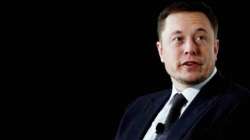Elon Musk fires entire Twitter board after takeover; named sole director
Elon Musk has made a number of pronouncements since early this year about how to fix Twitter and it remains unclear which proposals he will prioritise.

Elon Musk on Monday fired Twitter’s board of directors and made himself the sole member, according to a company filing with the Securities and Exchange Commission. Later, taking to Twitter, the Tesla CEO said the new board setup is “temporary”. He, however, did not provide any further details.
The billionaire closed the USD 44 billion Twitter acquisition deal last week and took control of the micro-blogging platform.
According to the company's statement, Twitter's board members, including Bret Taylor, Parag Agrawal, Omid Kordestani, David Rosenblatt, Martha Lane Fox, Patrick Pichette, Egon Durban, Fei-Fei Li and Mimi Alemayehou will now no longer serve on the board.
Musk is already floating major changes for Twitter and faces major hurdles as he begins his first week as the owner of the social media platform.
He’s testing the waters by asking users to pay for verification.
A venture capitalist working with Musk tweeted a poll asking how much users would be willing to pay for the blue check mark that Twitter has historically used to verify higher-profile accounts so other users know it’s really them.
Musk, whose account is verified, replied, “Interesting.”
Critics have derided the mark, often granted to celebrities, politicians, business leaders and journalists, as an elite status symbol.
Twitter also uses the blue check mark to verify activists and people who suddenly find themselves in the news, as well as little-known journalists at small publications around the globe, as an extra tool to curb misinformation coming from accounts that are impersonating people.
Having taken ownership of the social media service, Musk has invited a group of tech-world friends and investors to help guide the San Francisco-based company’s transformation, which is likely to include a shakeup of its staff.
Musk last week fired CEO Parag Agrawal and other top executives.
There’s been uncertainty about if and when he could begin larger-scale layoffs.
“I do think there will be a lot of layoffs,” said Matthew Faulkner, an assistant finance professor at San Jose State University.
Faulkner noted the need for cost-cutting after Musk bought Twitter for a premium and the platform’s longtime struggles trying to turn a profit. But Musk might also want as quickly as possible to weed out employees who don’t believe in his mission so that those who stay feel more secure.
Elon Musk and the Twitter takeover deal
Musk agreed to buy Twitter for $44 billion in April but it wasn’t until Thursday evening that he finally closed the deal, after his attempts to back out of it led to a protracted legal fight with the company.
Musk’s lawyers are now asking the Delaware Chancery Court to throw out the case, according to a court filing made public Monday.
The two sides were supposed to go to trial in November if they didn’t close the deal by the end of last week.
Musk has made a number of pronouncements since early this year about how to fix Twitter and it remains unclear which proposals he will prioritise.
He has promised to cut back some of Twitter’s content restrictions to promote free speech, but said Friday that no major decisions on content or reinstating of banned accounts will be made until a “content moderation council” with diverse viewpoints is put in place.
He later qualified that remark, tweeting “anyone suspended for minor & dubious reasons will be freed from Twitter jail.”
The head of a cryptocurrency exchange that invested $500 million in Musk’s Twitter takeover said he had a number of reasons for supporting the deal, including the possibility Musk would transition Twitter into a company supporting cryptocurrency and the concept known as Web3, which many cryptocurrency enthusiasts envision as the next generation of the internet.
“We want to make sure that crypto has a seat at the table when it comes to free speech,” Binance CEO Changpeng Zhao told CNBC on Monday.
“And there are more tactical things like we want to help bring Twitter into Web3 when they’re ready.”
He said cryptocurrency could be useful for solving some of Musk’s immediate challenges, such as the plan to charge a premium membership fee for more users.
“That can be done very easily, globally, by using cryptocurrency as a means of payment,” he said.
(With inputs from AP)